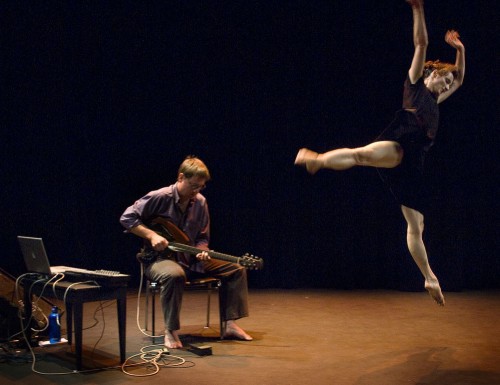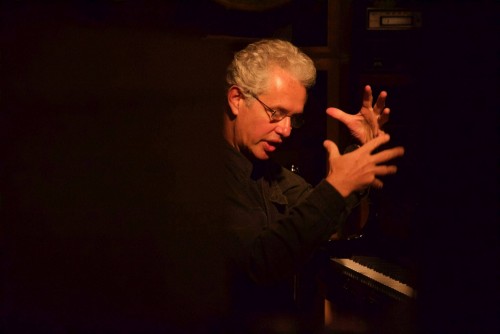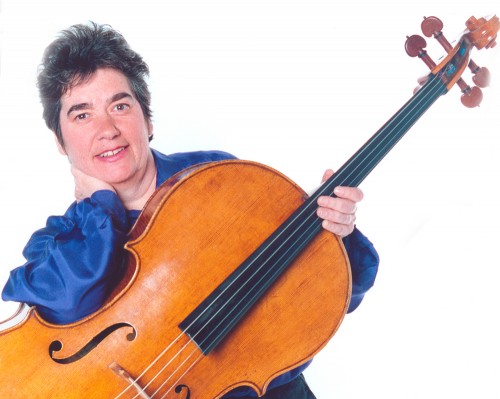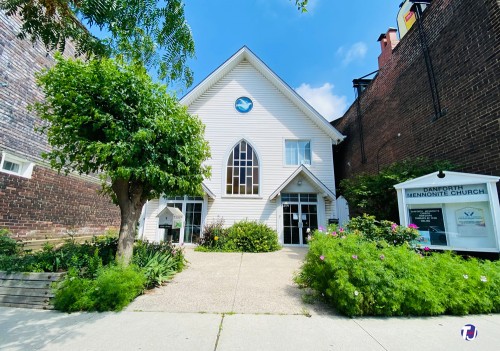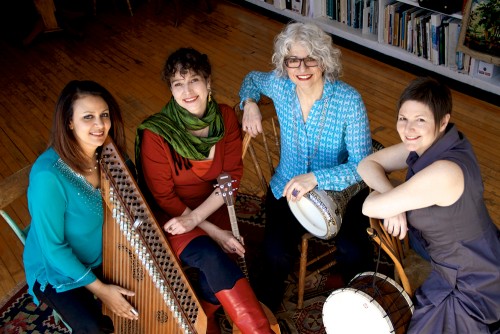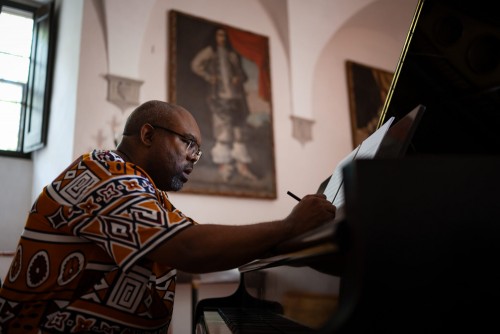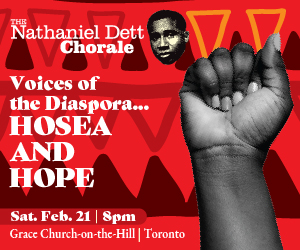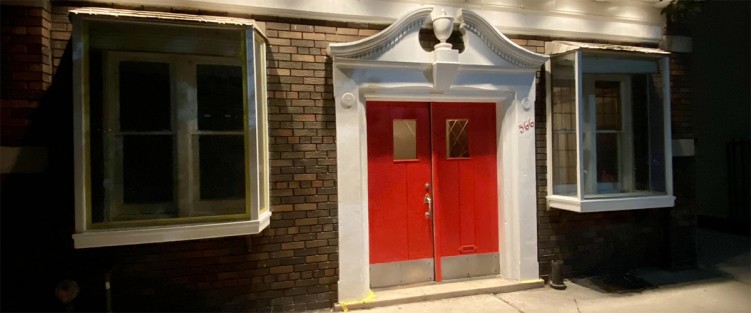 Now that the fall season has arrived, it’s a good time to dig into what’s new on the horizon, especially in venues that may be less familiar but offer unique possibilities for creative music-making. One such place in Toronto’s west end is the Annette Studios, which will host The Art of Improv on September 28, a series launched in 2023 by musicians Bill Gilliam and Eugene Martynec.
Now that the fall season has arrived, it’s a good time to dig into what’s new on the horizon, especially in venues that may be less familiar but offer unique possibilities for creative music-making. One such place in Toronto’s west end is the Annette Studios, which will host The Art of Improv on September 28, a series launched in 2023 by musicians Bill Gilliam and Eugene Martynec.
Their goal is to invite artists with distinctive approaches to improvisation to join them for an evening of collaboration. I recently talked with Gilliam, Martynec and invited guest composer-guitarist John Gzowski about their September show, which will bring Gilliam and Martynec together in the first set with a guest still to be announced, and in the second set with Gzowski and dancer Julia Aplin.
Gzowski and Aplin, as a husband-and-wife team, have been collaborating for more than 30 years. Their most recent performance took place in Hamilton at McMaster’s LIVELab, a hybrid performance venue and psychology research centre, where they worked with LIVElab founder Dr. Laurel Trainor, artist-engineer Jim Ruxton, and playwright Anna Chatterton. They incorporated biomedical testing tools, working with motion capture, EEG and EKG data, video, sound and lighting.
In other recent projects, Gzowski composed the score for Hamlet, directed by Robert Lepage, and for the Mahabharata, presented by Whynot Theater. For the September concert, he will be performing on his Moog electric guitar and laptop electronics, and together with Aplin, they will bring an assortment of homemade instruments and found objects into the mix.
Eugene Martynec has had a long career as a composer and record producer, and for decades he has explored the cutting edge of musical technology. These days he’s working with Midiax, a software program that lets him improvise live using just a computer mouse. Originally developed as one of the first sequencing programs for the Atari STE, Midiax remains central to his practice. “What I’ve done over the years is assemble what I call scenarios—basically timbres or instrument sounds that I think work well together—and I’ve married them to Mouse Gestures, which come with the program. It’s very interactive, and I’m able to change things quickly, so I can react to other players. It makes me feel like I’m actually playing an instrument.”
When improvising with Gilliam and the series’ guests, Martynec chooses sounds that complement the instruments at hand. Over the past four years, he and Gilliam have also formed a trio with flute player Bill McBurnie, releasing several albums and developing a distinctive musical language.
Bill Gilliam focuses on piano performance, expanding the instrument’s sonic palette using mallets, brushes, ping-pong balls and other objects placed inside the instrument, blending its altered sounds with those of the other musicians. At times, he augments the piano with samplers and loop stations, enabling him to process sounds live and further extend his improvisational vocabulary.
His partnership with Martynec was inspired by their time in the Toronto Improvisers Orchestra, after which they decided to focus on working with smaller groups in duos and trios. They began by inviting artists with a unique vision of improvisation. Annette Studios provides the perfect setting: a fine piano, a dance floor, and space for about forty people.
They present concerts three or four times a year, keeping the series artist-driven and paying guest musicians from door receipts. Attendance has been steadily growing with an expanding following. Gilliam noted that at their spring concert they invited Christine Duncan and the Element Choir—the choir’s first performance since COVID. I attended that evening, and it was an exhilarating experience to hear both Duncan and the choir create spontaneous music that also built a sense of community, by speaking directly to the audience, sharing their unique point of view on the process.
Why improvisation? For Gilliam, “pretty much everything I create starts with improvisation. It has that element of discovery and newness. As composers, we’re always looking for new approaches and exploring new languages,” he says. Gzowski agrees: “Composing and improvisation are pretty much the same thing, just happening at different speeds.”
He recalls hearing Casey Sokol, a long-time member of the CCMC, the Music Gallery’s original improvising ensemble. “[Casey] could improvise something that sounded like a composed piece. That’s the goal. To create something on the fly that is as well thought out as if you’d taken the time to write it. Some things are harder to notate than others but easier to create.”
Martynec echoes these thoughts, saying that for him, improvisation always comes first. He likes to “fool around” with sounds for a while to develop techniques he can draw on later. Because there’s nothing tactile about the instrument he works with, he tries to “get inside the sound to feel as if I’m manipulating it.” Those experiments then carry into the live situation.
Kye Marshall: The first set of the evening was to have been an opportunity for Martynec to join again with his longtime friend Mark Gane – a rock guitarist with an experimental edge and a flair for improvisation, and a founding member of the band Martha and the Muffins – but Gane is no longer available. At the last minute, cellist Kye Marshall, no stranger to Art of Improv, has agreed to step in, and will be joining Gilliam and Martynec for the first set. Whatever unfolds in that set instead will one way or another still provide a great segue into the second set. After all, as Gilliam noted in our interview, these improvisations can turn into one long piece, or several shorter ones, depending on the moment. That’s the appeal and magic of this way of creating music together.
Music in Unexpected Places
The Tranzac: Another newer voice in Toronto’s music landscape is Slow Rise Music, a concert series founded in 2021 by vocalist and curator McKenzie Warriner together with composer-performer Tristan Zaba. Their aim is to connect the city’s vocal and experimental music communities, encouraging unlikely encounters and adventurous collaborations. On September 27 and 28, their concert Collide-o-Scope will feature singer Samantha Selci alongside an ensemble of saxophone, tape loops, electric guitar, jazz piano, bass, and drums. Adding a physical dimension to this mix will be martial artist Alex Machete, offering another chance to experience the interplay of sound and movement. The venue is the Tranzac Club, an essential hub for Toronto’s ever-expanding range of music and performance. The concert will also be available via livestream.
Danforth Mennonite: Continuing the theme of intimate venues where new music flourishes, Mark Battenberg Music offers a series of concerts celebrating the arrival of autumn. A composer, guitarist, and community builder, Battenberg is devoted to creating shared spaces where meditative, elemental-themed music invites reflection and connection. This season he presents his Autumn Trilogy of Music in three parts at Danforth Mennonite Church. The first, on September 20, features Battenberg on guitar with Debbie Danbrook on shakuhachi flute performing his original compositions. Part Two, on October 4, highlights his Suite for Solo Guitar, and the final concert on October 25 brings cellist Sybil Shanahan together with Battenberg and Danbrook for a celebratory close to the trilogy.
Kitchener-Waterloo: Hopping over to the Kitchener-Waterloo area, The Douglas Haas Legacy Concerts are a longstanding series of midday performances held at St. Andrew’s Presbyterian Church. For decades, the series has presented a range of artists and ensembles in an intimate, community-oriented setting. On September 24, three compositions by Carol Ann Weaver will be featured. Weaver has been especially active recently in her musical support for Ukraine, and her piece Sounds For Ukraine honours the suffering of its people while offering hope and courage. It’s both a lament and prayer for healing. Kalahari Kaleidoscope, inspired by the vast desert landscapes of southern Africa, layers field recordings with instrumental sounds to evoke the desert’s fragile ecosystems. The same concert will be presented on September 23 at 1st United in Waterloo.
Another concert taking place in the region, presented by the Kitchener-Waterloo Chamber Music Society at the Keffer Memorial Chapel (Waterloo) on October 4, features Turkwaz: a Toronto-based vocal quartet that blends music from the Middle East, Turkey, Greece and the Balkans. Members Maryem Hassan Tollar, Jayne Brown, Sophia Grigoriadis, and Brenna MacCrimmon are well-loved performers on the Toronto scene, often performing at the Tranzac Club and the Drom Taberna. Together, they bring both a deep love of these traditions and a gift for reimagining them with unexpected, inventive interpretations.
At St. George’s Grange Park (for many years the home of the Music Gallery), the music of South Africa plays a prominent role at an upcoming New Music Concert event there on October 4, featuring the work of composer Andile Khumalo. Khumalo’s music is shaped by his passion for two distinct musical worlds: the spectral aesthetics of the concert tradition and the vibrant musical heritage of his South African homeland.
The program includes several works from his recent album Tracing Hollow Traces, among them the title track for clarinet. The piece explores his fascination and passion for sonic colour through extended techniques such as multiphonics, trills and slap-tongue. ISO[R], for piano, flute, and cello, pushes each instrument to extremes to create bold sonic relationships, while Wade Through Water, for clarinet and piano, reflects his gift for weaving diverse influences into a single voice. By bringing these worlds together, Khumalo seeks unity rather than contrast, inviting listeners to make a connection with the sound world itself beyond labels or genres.
From Toronto to Kitchener-Waterloo, this fall’s programs promise unique collaborations in unusual venues open to offering music that thrives on risk and discovery.
Wendalyn Bartley is a Toronto-based composer and electro-vocal sound artist. sounddreaming@gmail.com


